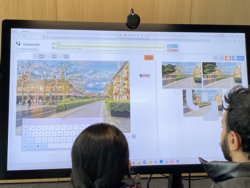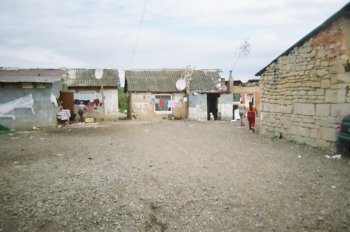Humanitarian Engineering is an integral part of the research agendas at the faculties of Engineering Technology (ET), Geo-Information Science and Earth Observation (ITC), and Behavioural, Management and Social Sciences (BMS).
Our research focuses on addressing complex challenges in areas with limited resources or in crisis. Through interdisciplinary collaboration, we aim to develop practical, context-sensitive solutions that support communities and contribute to sustainable development.
This work often involves navigating institutional, technical, and social complexities. While the path to impact can be challenging, it also presents opportunities for meaningful contributions—both within academia and in the field.
Ongoing Projects
This series of projects aims to investigate the potential of innovative methods, such as thermal cameras and hyperspectral cameras, for the detection of landmines in sand and clay-type soils. This is an important research because as many as 100 million mines pose significant hazards in more than 68 countries worldwide.
More information about the project can be found here.
Contact person
Virtual Serious Gaming training for an Infectious disease treatment center with WHO-Techné Co-Design for climate sensitive urban spaces with disadvantaged populations Blue and green spaces hold many benefits for human health, particularly in the context of climate change. They provide cooling effects and reduce air pollution, and safeguard mental and social well-being. The most disadvantaged parts of the population often miss out on nature’s benefits due to a lack of such spaces nearby and barriers related to infrastructure, stigma, and lack of involvement in planning processes.
We aim to counteract these barriers by considering their needs and including them in urban planning processes. We use geoinformation systems and artificial intelligence for visualizing and exploring potential changes to the city landscape, and involve these population groups, as well as decision-makers, in a participatory co-design approach.
Read more information here.
Contact person
Strengthening water and health security in Europe’s marginalized communities through integrated social, geographical, medical and technological approaches
Vulnerable groups at the margins of societies in Europe, such as Roma people, often live in informal settlements, where they are excluded from access to safe drinking water, sanitation, and waste management. Understanding the extent of related high health risk and providing assistance through targeted interventions are complicated by the invisibility of this group and the inaccessibility of reliable, up-to-date information.
We aim to improve the acquisition of information on water insecurity and related health risks among Roma communities and develop an innovative assessment system that integrates social, medical, geoinformation, and earth observation science methods.
Read more information here.
Contact person
PhD research
Julianne Schillinger: Impacts of armed conflict on water management and governance in the Middle East PhD project of Julianne Schillinger focuses on the impacts of armed conflict on water management and governance in the Middle East
Supervised by: Gül Özerol and Michiel Heldeweg
Amro Wawi: Data governance and infrastructure in the Palestinian water sector PhD project of Amro Wawi focuses on the assessment of data governance and infrastructure in the Palestinian water sector
Supervised by: Gül Özerol and Michiel Heldeweg
Isaac Bessara: Socio-technical decision-making in resilient housing and settlement PhD project of Isaac Besarra focuses on the impacts of post-disaster housing reconstruction processes on sustainable livelihood, in self-recovering communities in the Philippines
Supervised by: Eefje Hendriks, Karin Pfeffer and Marc van den Homberg
Sahara Sedhain: Assessing the suitability and performance of trigger models for Anticipatory Actions PhD of Sahara focuses on assessing the suitability and performance of trigger models for Anticipatory Actions
Supervised by Norman Kerle and Marc van den Homberg
Zikambiyani Haanyika: Design for social justice in technology-based development initiatives PhD of Zikambiyani focuses on designing for social justice in technology-based development initiatives.
Supevised by: Nina Trauernicht, Alberto Martinetti and Eric Lutters
Manar Obeidat: Designing educational structures for a master apprentices model in resource-limited settings PhD of Manar Obeidat focuses on designing educational structures for a master apprentices model in resource-limited settings, addressing mainly refugee camps in Jordan.
Supervised by: Nina Trauernicht, Alberto Martinetti, Eric Lutters
Carolyne Chemweno: Inclusive education practices for student mental and psychosocial well-being in technology education PhD of Carolyne Chemweno focuses on inclusive education practices for student mental and psychosocial well-being in technology education.
Supervised by Alberto Martinetti, Eric Lutters
Samwel Mwaniki: Enhancing Engineering Curricula for Resource-Constrained Vocational Schools PhD of Samwel Mwaniki focuses on enhancing engineering curricula for resource-constrained vocational schools
Supervised by: Peter Chemweno, Alberto Martinetti, Eric Lutters
Student movement
The University of Twente hosts an active chapter of ENACTUS—a global student organization operating in 37 countries. ENACTUS empowers students to turn their ideas into long-term, socially driven projects aligned with the UN Sustainable Development Goals (SDGs).
By working on initiatives that create tangible social impact, students gain hands-on experience in responsible leadership and sustainable innovation. Curious about how they make a difference? Get involved and see the impact for yourself. Visit the Enactus Twente website.
research Collaboration
Organizations, NGOs, and knowledge institutions interested in collaborating with the Humanitarian Engineering research group are warmly encouraged to get in touch. We welcome opportunities to conduct research in partnership with companies, explore joint projects, and offer professional education.
For collaboration inquiries, you can find the appropriate contact person below.













